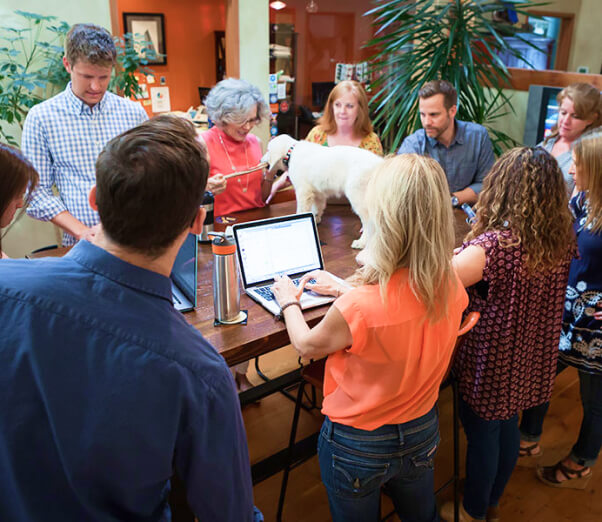Key Themes and Takeaways from SXSW 2024
In 2024, GroundFloor Media attended SXSW and hosted the Denver Download for the 13th time.
The conference takes place over five days in Austin, Texas, with more than 300 sessions that range from trends in digital marketing to the changing world of work, emerging technology and everything in between. This year, the top themes of the conference focused on the rise of loneliness, embracing DEIA initiatives, navigating the rapid pace of change and how all of this impacts the important and intentional work of brand-building.
The Rise of Loneliness
One topic mentioned in nearly every session was the loneliness epidemic — a public health crisis underscored by the U.S. Surgeon General’s advisory concerning how loneliness and social isolation can increase the likelihood of premature death at a risk level comparable to smoking 15 cigarettes a day.
The loneliness crisis is affecting people across all demographics, and is shifting consumer behaviors as people seek happiness and connection.
Factors Behind the Loneliness Epidemic
Panelists shared that, while smartphones and technology play a role in the isolation, there are other contributing factors. As a society, we have a culture of rugged individualism that results in fewer communal touchpoints. Additionally, the post-pandemic work-life integration has blurred the lines of professional and personal spaces, increasing the feeling of perpetual busyness.
The Role of Brands in Solving Loneliness
There isn’t just a Corporate Social Responsibility (CSR) case for helping to solve loneliness, but a business case, too. For Gen Z, health and wellness are the key factors driving consumption. Businesses are currently more trusted than the government and media, positioning them to authentically connect with consumers. To do this, panelists encouraged brands to think beyond product and build meaningful brand experiences. Making community-building central to your brand strategy will be key to connecting with your audiences in 2024 and beyond.
Embracing DEIA Initiatives
Another prominent theme was the imperative for brands to incorporate Diversity, Equity, Inclusion, and Accessibility (DEIA) into their identities. SXSW made it clear: Performative allyship isn’t just ineffective, but it can lead to missed opportunities for customer connections. If a company only considers queer allyship during pride month, they’re missing an opportunity to have a more authentic, more supportive relationship with their queer and queer-allied audiences. The call is for sustained support that resonates year-round, not just during designated months or events.
Making the Business Case for DEIA
Leading brands, like Levi’s with their gender-neutral clothing line, have shown that a steadfast commitment to DEIA isn’t just a moral stance — it’s a strategic one. Businesses can leverage inclusion to outperform competitors, tapping into rich, varied perspectives and insights that might otherwise be overlooked.
DEIA as Brand Identity
Long-term dedication to DEIA as a core value was highlighted as a non-negotiable brand attribute. By embedding DEIA principles across company strata and recognizing the multifaceted identities of people from marginalized groups, brands can engender loyalty and advocacy that transcend the transactional.
Navigating the Rapid Pace of Change
SXSW is always about the latest trends, but this year there seemed to be a strong desire to not just know what’s the next thing, but what’s the next right thing. We’ve endured a lot of change over the last five years. AI is obviously a part of it, but there’s also been the pandemic, Web 3.0, NFTs, Bitcoin, rapidly changing consumer behaviors and more. The conversation at the conference focused on getting comfortable with the unknown and with the pace of disruption. To navigate these constant changes, panelists recommended not getting distracted by hype, and instead focusing on strategic adoption of new technologies.
How SXSW Trends Translate to Intentional Brand-Building
These themes, the rise of loneliness, embracing DEIA and constant change, underscore some things we’ve always known: Trust and authenticity remain the cornerstones of a strong brand strategy. Embracing trends inauthentically will nearly always backfire.
In one panel, experts shared the example of Kraft Mac & Cheese asking social media users to #SendNOODS. For other brands, the campaign had all the elements of success, but for Kraft, engaging with this risqué digital request felt totally out of step with their wholesome brand identity.
A communications agency emphasized this with their presentation of the Trust Loop — their proposed replacement for the purchase funnel. In this model, the goal of marketing is expanded beyond purchase into an ongoing relationship that includes advocacy and repeat purchase.
Actionable Strategies for Brands
If you’re looking for ideas on how to put these insights to use for your organization, here are three strategies you can implement today.
- Focus on Brand Experience & Engagement
Focusing on brand experience and engagement means viewing every interaction as an opportunity to reinforce the brand’s promise and to deepen the customer’s connection to the brand. This ensures that each engagement adds value to the ongoing relationship, which solidifies brand loyalty and advocacy.
- Leverage Data for Personalization
Use data analytics not just to target but to truly understand your audience. This allows for personalized experiences that show consumers they are seen and valued beyond their transactional worth.
- Make DEIA Part of Your Brand Identity
Reflect DEIA values consistently in your messaging. Show support for various communities throughout the year, integrating DEIA values into the fabric of your brand rather than relegating them to certain times or events.




